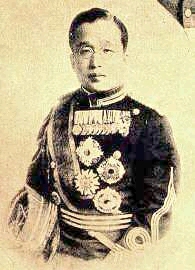- Crown Prince Euimin
Infobox Korean name

imgwidth=195px
hangul=의민태자
hanja=懿愍太子
rr=Uimin Taeja
mr=Ŭimin T'aecha
hangulborn=이은
hanjaborn=李垠
rrborn=I Eun
mrborn=Yi Ŭn
othername1=Imperial title
hangul1=영친왕
hanja1=英親王
rr1=Yeongchinwang*
mr1=Yŏngch'inwang
text=*meaning "Prince Imperial Yeong"Prince Imperial Yeong, the
Crown Prince Uimin,GBE (also Euimin), (20 October ,1897 –1 May ,1970 ) was the 28th Head of Korean Imperial House, and the last crown prince ofKorea .He was born on
20 October 1897 at Deoksu Palace inSeoul as the seventh son of Gojong, the Gwangmu Emperor and his second wife, Princess Sunheon. He was also the younger half-brother by a different mother of Emperor Sunjong andPrince Imperial Ui . He was titled "Prince Imperial Yeong" in 1900, and became the crown prince in 1907, despite being younger than Prince Ui. Prince Ui's influence to the throne was not strong because his own mother, Lady Jang, had already died.In December 1907, he was taken to Japan on the pretence of his studies and he married Princess Nashimotonomiya Masako of Japan (born
4 November 1901 –30 April 1989 ), the eldest daughter of Prince Nashimoto Morimasa, on28 April 1920 atTokyo . In 1910, when Emperor Sunjong was forced to abdicate by Japan, he was titled "HisRoyal Highness Crown Prince Lee of Korea". On24 April 1926 , he became "King Yi of Korea" (demoted Korean sovereign's title after the Japan-Korean Annexation Treaty) when Emperor Sunjong died.Prince Yi Eu (also known as Prince Ri Gin in Japan) served in
Japanese Army as Commanding Officer 59th Regiment, 4th Depot Division, 51st Division. He also served in theImperial Japanese Army Air Force with the rank of general, commandingIJA 1st Air Army . He further served as Instructor at Military Staff College, attached to theInspectorate General of Military Training and became a Member of theSupreme War Council during wartime.After Korea became independent of the
Empire of Japan in 1945, he asked PresidentSyngman Rhee to allow him to return to Korea with his family but was refused. He was offered a position of Korean Ambassador to the Court of St. James's in 1960, but refused on the grounds of ill health. In November 1963, (with request from PresidentPark Chung-hee ) he and his wife, Crown Princess Bangja, came back to Korea for the first time in 56 years but was already unconscious fromcerebral thrombosis and was rushed to Seoul Sungmo Hospital where he remained bedridden for the rest of his life.After that, he lived at Nakseon Hall,
Changdeokgung Palace, the former residence of Imperial house in Seoul with Bangja and his younger sister Princess Deokhye. Seven years after returning to his country, he died on1 May 1970 at Nakseon Hall, Changdeok Palace, Seoul. He was buried at Hongyureung in Namyangju, near Seoul and is known posthumously as Crown Prince Euimin of Korea.Children
*
Yi Jin (Ko-hhrm|hanja=李晋|hangul=이진|rr=I Jin) (born18 August 1921 –11 May 1922 ), the eldest son of Prince Eun and his wife, Princess Bangja. He was poisoned during a visit to Korea with his parents. His funeral was held on17 May 1922 and he is buried inKorea .
* Yi Gu (Ko-hhrm|hanja=李玖|hangul=이구|rr=I Gu) (born29 December 1931 –16 July 2005 ), the second son of Prince Eun and his wife, Princess Bangja. Prince Gu became the 29th Head of the Korean Imperial Household upon the death of his father.Titles from birth
* "
His Royal Highness " ThePrince Eun of Korea (1897 - 1900)
* "His Imperial Highness " The Prince Imperial Yeong of Korea (1900 - 1907)
* His Imperial Highness TheCrown Prince Eun of Korea (1907 - 1970)
** "His Royal Highness The Crown Prince Lee of Korea" (1910 - 1926)
** "HisMajesty The King Lee of Korea" (1926 - 1945)
* The Crown Prince Euimin of Korea (Posthumous Title)External links
*http://www.generals.dk/general/Yi/Un_Prince/Japan.html
Wikimedia Foundation. 2010.
